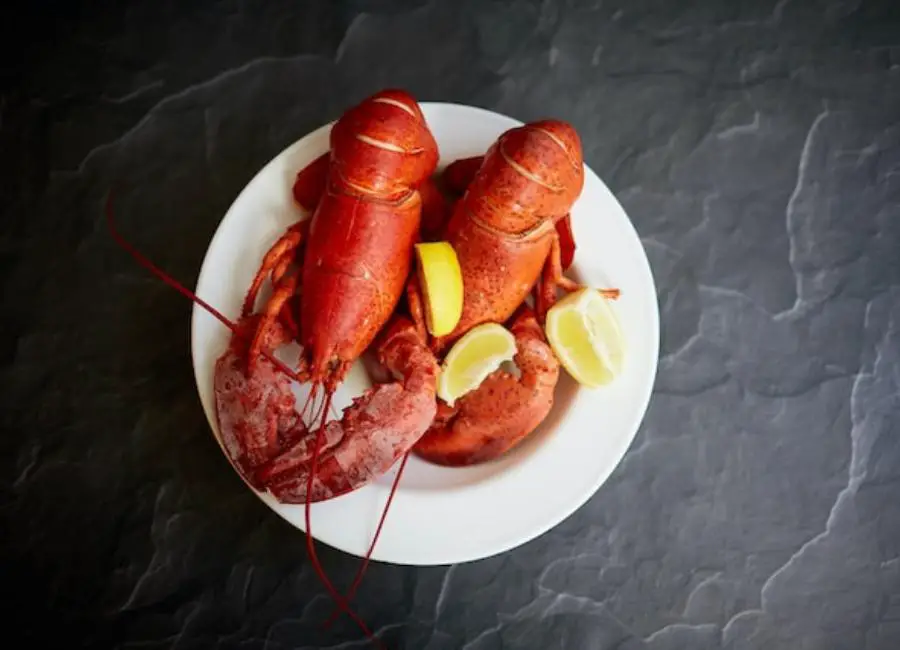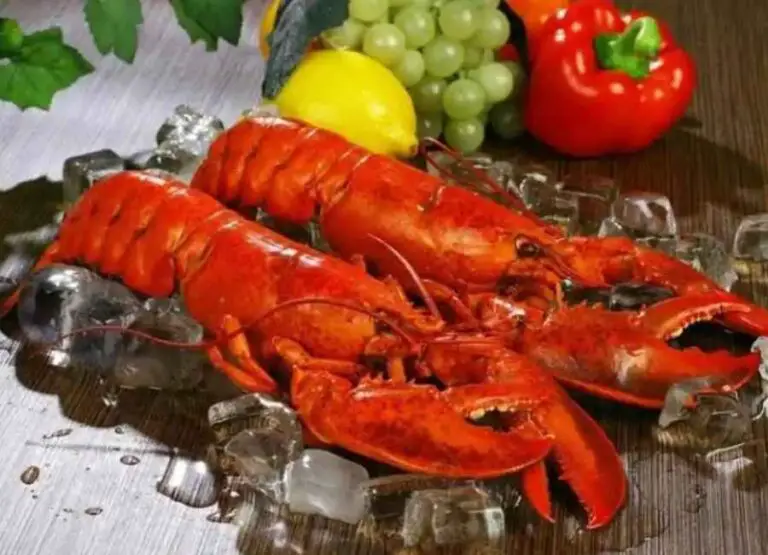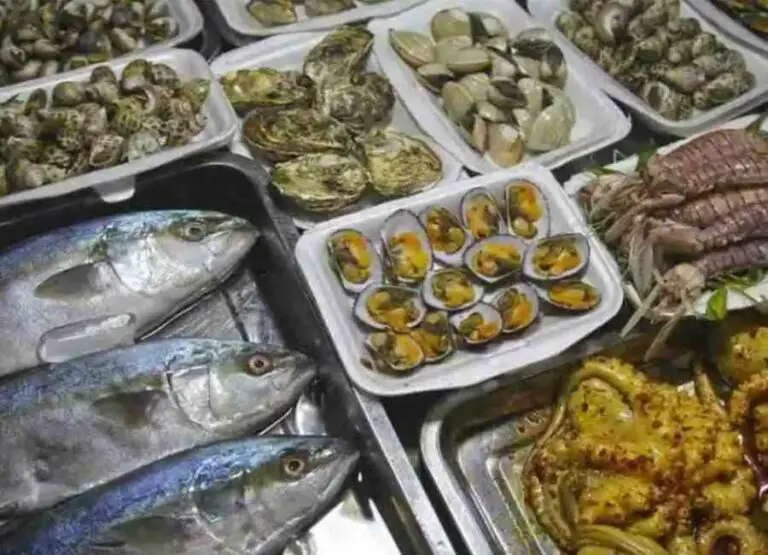Tips For Eating Lobster When Pregnant
Are you expecting and craving seafood? Let’s discuss eating lobster when pregnant…
Before indulging in a delicious lobster dinner, you may be wondering if it’s safe for both you and your baby.
We’ve done the research and have the answers for you.
Read on to find out if lobster is a safe choice for pregnant women and what precautions you should take.
Can you eat lobster while pregnant?
Yes, it is generally safe to eat lobster while pregnant in moderation, as lobsters are a good source of protein and omega-3 fatty acids, which are beneficial for both the mother and the baby.
You can eat lobster while pregnant as long as it has been cooked thoroughly.
According to Mayo Clinic, pregnant women can safely consume most seafood, including lobster, as long as it is cooked properly and not high in mercury or contaminated with pollutants.
However, it is always recommended to consult with a healthcare provider or registered dietitian for personalized advice on a healthy diet during pregnancy.
Nutritional benefits of lobster
Lobster has several nutritional benefits, and it is a great source of protein.
Additionally, it contains omega-3 fatty acids, which can help protect against heart disease, improve blood circulation, and support brain health.
Lobster is also rich in selenium, a mineral that can help reduce the risk of thyroid disease and some types of cancer.
Furthermore, lobster is low in calories, fat, and carbohydrates, making it a healthy option for people looking to lose weight or maintain a healthy weight.
Overall, lobster can be a nutritious and delicious addition to a balanced diet.
How to cook lobster for a pregnant woman
Here is a step-by-step process for preparing lobster for a pregnant woman:
Step 1: Choose a fresh lobster
To guarantee that the lobster you choose is safe to eat, it must be fresh.
Look for a live, active lobster when selecting one.
The antennae should be moving, and the tail should be tucked beneath the body.
Buying lobsters from a reputable seafood shop or grocery store is another smart move.
Learn more about the signs that a lobster is bad.
Step 2: Clean the lobster
It is necessary to clean the lobster properly before cooking it.
To start, thoroughly rinse the lobster in cold water to get rid of any dirt or debris.
If the lobster is still alive, immediately and humanely kill it with a sharp knife before washing it.
To do this, set the lobster on a cutting board, grasp the tail firmly with one hand, and cut through the middle of the head with a sharp knife.
Remove the claws and tail from the body and throw away the head.
Step 3: Cook the lobster
A large saucepan of salted water should be brought to a boil.
For every quart of water, the conventional guideline is to add around 2 teaspoons of salt.
The lobster should be cooked for 8 to 10 minutes, or until the meat is opaque and the shell is brilliant red after the water reaches a rolling boil.
Watch the lobster carefully while it cooks to prevent overcooking, which can produce tough, rubbery flesh.
Step 4: Remove the meat from the lobster
Remove the cooked lobster from the saucepan and allow it to cool a little.
Start by breaking open the claws to get the flesh out of the shell.
To open the claw and retrieve the flesh, use a pair of kitchen shears or a lobster cracker.
Make careful to throw away any shell fragments that may have come apart during the breaking.
The flesh from the tail should then be removed by cutting down the middle with a pair of kitchen shears.
A word of caution: the green tomalley and roe may carry dangerous germs.
If the lobster has any of these organs, throw them away right away.
Step 5: Serve the lobster
After being freed from the shell, the meat can either be consumed right away or refrigerated for later use.
For a well-rounded dinner, serve it with a side of steamed veggies and a grain like rice or quinoa.
A squeeze of lemon juice is also a smart idea to add for taste.
Learn more about some tips for cooking lobsters.
Benefits of eating lobster when pregnant
Here are some potential benefits of eating lobster during pregnancy:
- Protein: Lobster is a good source of protein, a nutrient that is important for building and repairing tissue, especially during pregnancy when the body’s demand for protein increases.
- Omega-3 fatty acids: Lobster is a good source of omega-3 fatty acids, which are essential nutrients that support brain and eye development in fetuses.
- Iron: Lobster is also a good source of iron, which is important for preventing anemia during pregnancy.
- Zinc: Lobster is a good source of zinc, which supports the immune system and helps with fetal growth and development.
- Vitamin B12: Lobster contains vitamin B12, which is important for healthy nerve and brain function.
- Low in saturated fat: Lobster is low in saturated fat, which can contribute to heart disease and other health problems.
- Low in calories: Lobster is relatively low in calories, which can help prevent excessive weight gain during pregnancy.
- Low in mercury: While some seafood can contain high levels of mercury, lobster is generally considered to be low in this contaminant.
- Dietary variety: Eating a variety of seafood, including lobster, during pregnancy can help ensure that you’re getting a balance of nutrients for your own health and the health of your growing fetus.
Guidelines for Eating Lobster When Pregnant
As with any food, it’s important to practice good food safety when eating lobster while pregnant.
Here are some general guidelines to follow:
- Make sure the lobster is fully cooked: Cooking the lobster until it is steaming hot all the way through will kill any harmful bacteria that may be present.
- Avoid raw or undercooked lobster: Raw or undercooked seafood can contain bacteria or viruses that could harm your unborn baby.
- Avoid smoked lobster: Smoked lobster is not recommended during pregnancy because the smoking process may not fully cook the meat all the way through.
- Limit consumption of lobster: While lobster is a healthy source of protein, it is also high in cholesterol. The American Pregnancy Association recommends limiting cholesterol intake to 300mg per day during pregnancy. One serving of lobster contains about 117mg of cholesterol.
- Avoid high-mercury lobster: Lobster is considered a low-mercury seafood, which means it can be safely consumed in moderation during pregnancy. However, if you are concerned about mercury intake, you may want to limit your consumption of certain species such as spiny lobster, which can contain higher levels of mercury.
- Wash your hands and utensils: To prevent the spread of harmful bacteria, it is important to wash your hands and all utensils thoroughly before and after handling raw lobster.
- Refrigerate leftovers promptly: Cooked lobster should be refrigerated promptly, preferably within an hour of cooking, and should be consumed within 2-3 days.
- Avoid cross-contamination: To prevent cross-contamination, it is important to keep raw seafood separate from ready-to-eat foods and to use separate cutting boards, utensils, and storage containers.
- Consult with your healthcare provider: As with any dietary concerns during pregnancy, it is important to consult with your healthcare provider to determine what is best for you and your baby.
Learn more about eating undercooked lobster.
Risks of eating lobster while pregnant
Some of the common risks associated with eating lobster while pregnant may include:
- Mercury: Like other seafood, lobster can contain high levels of mercury which can be harmful to developing fetuses. Pregnant women are advised to eat only a limited amount of seafood that is low in mercury.
- Food Poisoning: Seafood such as lobster can carry harmful bacteria and viruses that can cause food poisoning. Pregnant women are more susceptible to foodborne illnesses because their immune system is weakened during pregnancy.
- Shellfish allergies: Eating shellfish such as lobster can trigger an allergic reaction in some people, which can be potentially life-threatening.
- High Cholesterol: Lobster is high in cholesterol which can be harmful to pregnant women who have high cholesterol levels.
- Environmental Contaminants: Lobster and other seafood can be exposed to environmental contaminants such as PCBs and dioxins. Pregnant women are advised to avoid seafood that is known to be exposed to these pollutants.
- Gout Attacks: Lobster contains high levels of purines, which can trigger gout attacks in people who are susceptible to the condition.
- Digestive Upset: The high levels of fat and protein in lobster can cause digestive upset such as indigestion, nausea, and vomiting in some people.
- High Sodium: Lobsters can be high in sodium which can contribute to high blood pressure during pregnancy.
- Interactions with Medications: Some medications used during pregnancy may interact with the nutrients found in lobster, which can cause adverse effects on the developing fetus.
Learn more about the signs of lobster food poisoning.
Alternatives to eating lobster during pregnancy
During pregnancy, it is important to be cautious about the foods you eat and to take steps to avoid foods that may pose a risk to you or your baby.
If you are looking for alternatives to eating lobster during pregnancy, there are many other seafood options that are safe to consume.
Some safe seafood options for pregnant women include:
- Cooked shrimp
- Cooked crab
- Cooked salmon
- Cooked tilapia
- Cooked catfish
- Cooked cod
It is important to note that when consuming seafood during pregnancy, you should avoid raw or undercooked seafood, as well as high-mercury fish such as shark and swordfish.
Additionally, it is important to ensure that the seafood is cooked to the appropriate temperature to prevent the risk of food poisoning.
Conclusion
Pregnancy can be a time of cravings and dietary restrictions, especially when it comes to seafood.
Although there are some concerns about consuming lobster while pregnant, it can actually be a safe and nutritious choice when cooked properly.
So go ahead and indulge in that delicious lobster tail, or try a creamy lobster bisque – just make sure it’s made with fresh, properly cooked seafood and enjoy!


![Can You Eat Crab Raw [Answered]](https://foodcreeks.com/wp-content/uploads/2023/02/Can-you-Eat-crab-raw-768x555.jpg)


![How To Know Lobster Is Bad [Answered]](https://foodcreeks.com/wp-content/uploads/2023/01/How-To-Know-Lobster-Is-Bad-768x555.jpg)
![Can Lobster Be Eaten Raw [Answered]](https://foodcreeks.com/wp-content/uploads/2023/02/Can-lobster-be-eaten-raw-768x555.jpg)
![Can Pregnant Women Eat Crab Legs [Answered]](https://foodcreeks.com/wp-content/uploads/2023/03/Can-Pregnant-Women-Eat-Crab-Legs-768x555.jpg)